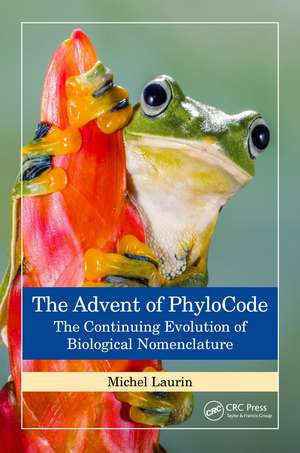The Advent of PhyloCode: The Continuing Evolution of Biological Nomenclature
Autor Michel Laurinen Limba Engleză Hardback – 3 aug 2023
Key Features
- Responds to the biodiversity crisis and the recent implementation of the PhyloCode
- Summarizes the spectacular progress of phylogenetics which makes it both increasingly easy and crucially important to define precisely taxon names
- Provides a 300-year historical perspective featuring high-profile characters, such as Linnaeus and Darwin
- Summarizes for a broad readership a widely scattered, highly technical and underappreciated scientific literature
- Documents the activities of the International Society for Phylogenetic Nomenclature, a scholarly society in which the author has played a prominent role
Preț: 526.98 lei
Preț vechi: 704.58 lei
-25% Nou
Puncte Express: 790
Preț estimativ în valută:
100.83€ • 105.85$ • 83.70£
100.83€ • 105.85$ • 83.70£
Carte tipărită la comandă
Livrare economică 10-24 aprilie
Preluare comenzi: 021 569.72.76
Specificații
ISBN-13: 9780367552886
ISBN-10: 0367552884
Pagini: 226
Ilustrații: 6 Tables, black and white; 25 Line drawings, black and white; 7 Halftones, black and white; 32 Illustrations, black and white
Dimensiuni: 210 x 280 x 19 mm
Greutate: 0.58 kg
Ediția:1
Editura: CRC Press
Colecția CRC Press
ISBN-10: 0367552884
Pagini: 226
Ilustrații: 6 Tables, black and white; 25 Line drawings, black and white; 7 Halftones, black and white; 32 Illustrations, black and white
Dimensiuni: 210 x 280 x 19 mm
Greutate: 0.58 kg
Ediția:1
Editura: CRC Press
Colecția CRC Press
Public țintă
Postgraduate, Professional, Professional Practice & Development, and Undergraduate AdvancedCuprins
Chapter 1: The Roots of Biological Nomenclature – A Short History of Systematics through the 19th century. Chapter 2: The Advent of the Rank-Based codes. Chapter 3: Rank-Based Nomenclature and Evolution. Chapter 4: Phylogenetic Nomenclature. Chapter 5: Comparisons with the nomenclature of other sciences and beyond. Chapter 6: Controversies. Chapter 7: Conclusion: The Future of Biological Nomenclature.
Notă biografică
Michel Laurin has been a tenured CNRS (Centre National de la Recherche Scientifique) research scientist since 1998. His specialty is the evolution of vertebrates from the Devonian to the Triassic. His current interests include dating the tree of life, as well as other problems such as the invasion of land by vertebrates, the appearance of the tympanum (ear drum), and origin of extant amphibians. This work has introduced new methods for paleontology and evo-devo, some of which have been implemented in computer programs. He has supervised 7 doctoral students. He has served on the governing council of various scientific societies, including the French Paleontological Association (APF), where he completed a term as President. More importantly, after adopting phylogenetic nomenclature early in his career, he served the ISPN (International Society for Phylogenetic Nomenclature), which develops and promotes a new code of biological nomenclature (the PhyloCode) as both Secretary (several terms, including a current one) and President. He currently serves on several editorial boards of scientific journals, including the Journal of Evolutionary Biology. In January 2011, he became Chief editor of the Comptes Rendus Palevol, which is published by the French Academy of Sciences. He has recently received the Charles Bocquet prize, which is awarded every three years by the Zoological Society of France to honor a career dedicated to evolutionary zoology. Since 2014, he has been the director of the team "Phylogeny and Diversification of Metazoans" in the National Museum of Natural History (Paris), which includes 14 tenured or emeritus scientists, in addition to post-doctoral and doctoral students.
Recenzii
“…the great advantage of this book is that it brings into the equation what inevitably applies to taxa: names.”
"Readers presumably interested in the evolution of ideas on evolution and phylogeny will be able to read The Advent of PhyloCode even if they have little interest in nomenclature."
“The organization of the book reflects and extremely structured and meticulous academic approach.”
“Fixing both names and the (phylogenetic) meaning of names: that is the role of PhyloCode.”
“… it will be particularly interesting to read the pages devoted to the question of the stability of names in relation to the evolution of phylogenetic knowledge.”
Pascal Tassy in Comptes Rendus Palevol, 2024, 23 (16).
“The Advent of PhyloCode can interest philosophers, science historians as well as zoologists, botanists and paleontologists. … As a whole, Laurin’s book exposes with great clarity all the facets of its subject, based on an impressive set of quotations and citations … This is why [the book] potentially addresses a broad and diverse academic readership, far beyond the scientific domain proper." Vivian de Buffrenil in Amphibia-Reptilia, 2024.
"Readers presumably interested in the evolution of ideas on evolution and phylogeny will be able to read The Advent of PhyloCode even if they have little interest in nomenclature."
“The organization of the book reflects and extremely structured and meticulous academic approach.”
“Fixing both names and the (phylogenetic) meaning of names: that is the role of PhyloCode.”
“… it will be particularly interesting to read the pages devoted to the question of the stability of names in relation to the evolution of phylogenetic knowledge.”
Pascal Tassy in Comptes Rendus Palevol, 2024, 23 (16).
“The Advent of PhyloCode can interest philosophers, science historians as well as zoologists, botanists and paleontologists. … As a whole, Laurin’s book exposes with great clarity all the facets of its subject, based on an impressive set of quotations and citations … This is why [the book] potentially addresses a broad and diverse academic readership, far beyond the scientific domain proper." Vivian de Buffrenil in Amphibia-Reptilia, 2024.
Descriere
Biological nomenclature is an essential tool for storing and retrieving biological information. Yet, traditional nomenclature poorly reflects evolutionary theory. The proposed book will reach a broader readership of those using nomenclature but unaware of its theoretical foundations.





